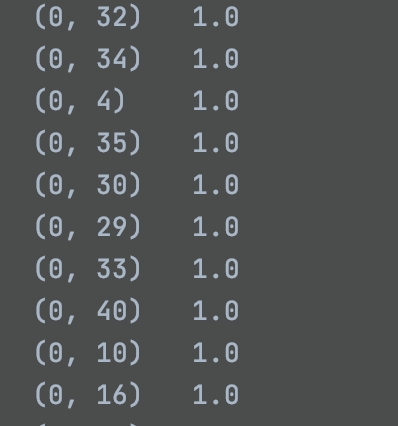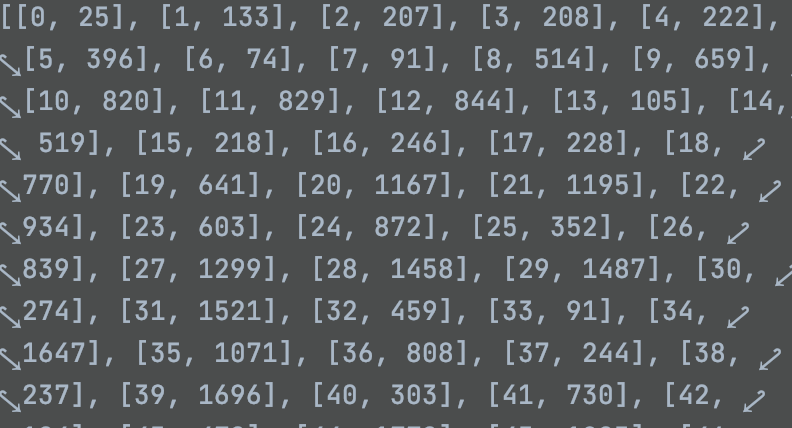# DataSet
'''
Created on Aug 8, 2016
Processing datasets.
@author: Xiangnan He (xiangnanhe@gmail.com)
'''
import scipy.sparse as sp
import numpy as np
class Dataset(object):
'''
classdocs
'''
def __init__(self, path):
'''
Constructor
'''
self.trainMatrix = self.load_rating_file_as_matrix(path + ".train.rating")
self.testRatings = self.load_rating_file_as_list(path + ".test.rating")
self.testNegatives = self.load_negative_file(path + ".test.negative")
assert len(self.testRatings) == len(self.testNegatives)
self.num_users, self.num_items = self.trainMatrix.shape
def load_rating_file_as_list(self, filename):
ratingList = []
with open(filename, "r") as f:
line = f.readline()
while line != None and line != "":
arr = line.split(" ")
user, item = int(arr[0]), int(arr[1])
ratingList.append([user, item])
line = f.readline()
return ratingList
def load_negative_file(self, filename):
negativeList = []
with open(filename, "r") as f:
line = f.readline()
while line != None and line != "":
arr = line.split(" ")
negatives = []
for x in arr[1:]:
negatives.append(int(x))
negativeList.append(negatives)
line = f.readline()
return negativeList
def load_rating_file_as_matrix(self, filename):
'''
Read .rating file and Return dok matrix.
The first line of .rating file is: num_users num_items
'''
# Get number of users and items
num_users, num_items = 0, 0
with open(filename, "r") as f:
line = f.readline()
while line != None and line != "":
arr = line.split(" ")
u, i = int(arr[0]), int(arr[1])
num_users = max(num_users, u)
num_items = max(num_items, i)
line = f.readline()
# Construct matrix
mat = sp.dok_matrix((num_users + 1, num_items + 1), dtype=np.float32)
with open(filename, "r") as f:
line = f.readline()
while line != None and line != "":
arr = line.split(" ")
user, item, rating = int(arr[0]), int(arr[1]), float(arr[2])
if (rating > 0):
mat[user, item] = 1.0
line = f.readline()
return mat
# evaluate.py
'''
Created on Apr 15, 2016
Evaluate the performance of Top-K recommendation:
Protocol: leave-1-out evaluation
Measures: Hit Ratio and NDCG
(more details are in: Xiangnan He, et al. Fast Matrix Factorization for Online Recommendation with Implicit Feedback. SIGIR'16)
@author: hexiangnan
'''
import math
import heapq # for retrieval topK
import multiprocessing
import numpy as np
from time import time
# from numba import jit, autojit
# Global variables that are shared across processes
_model = None
_testRatings = None
_testNegatives = None
_K = None
def evaluate_model(model, testRatings, testNegatives, K, num_thread):
"""
Evaluate the performance (Hit_Ratio, NDCG) of top-K recommendation
Return: score of each test rating.
"""
global _model
global _testRatings
global _testNegatives
global _K
_model = model
_testRatings = testRatings
_testNegatives = testNegatives
_K = K
hits, ndcgs = [], []
if (num_thread > 1): # Multi-thread
pool = multiprocessing.Pool(processes=num_thread)
res = pool.map(eval_one_rating, range(len(_testRatings)))
pool.close()
pool.join()
hits = [r[0] for r in res]
ndcgs = [r[1] for r in res]
return (hits, ndcgs)
# Single thread
for idx in range(len(_testRatings)):
(hr, ndcg) = eval_one_rating(idx)
hits.append(hr)
ndcgs.append(ndcg)
return (hits, ndcgs)
def eval_one_rating(idx):
rating = _testRatings[idx]
items = _testNegatives[idx]
u = rating[0]
gtItem = rating[1]
items.append(gtItem)
# Get prediction scores
map_item_score = {}
users = np.full(len(items), u, dtype='int32')
predictions = _model.predict([users, np.array(items)],
batch_size=100, verbose=0)
for i in range(len(items)):
item = items[i]
map_item_score[item] = predictions[i]
items.pop()
# Evaluate top rank list
ranklist = heapq.nlargest(_K, map_item_score, key=map_item_score.get)
hr = getHitRatio(ranklist, gtItem)
ndcg = getNDCG(ranklist, gtItem)
return (hr, ndcg)
def getHitRatio(ranklist, gtItem):
for item in ranklist:
if item == gtItem:
return 1
return 0
def getNDCG(ranklist, gtItem):
for i in range(len(ranklist)):
item = ranklist[i]
if item == gtItem:
return math.log(2) / math.log(i + 2)
return 0
# ials.py
# coding=utf-8
# Copyright 2021 The Google Research Authors.
#
# Licensed under the Apache License, Version 2.0 (the "License");
# you may not use this file except in compliance with the License.
# You may obtain a copy of the License at
#
# http://www.apache.org/licenses/LICENSE-2.0
#
# Unless required by applicable law or agreed to in writing, software
# distributed under the License is distributed on an "AS IS" BASIS,
# WITHOUT WARRANTIES OR CONDITIONS OF ANY KIND, either express or implied.
# See the License for the specific language governing permissions and
# limitations under the License.
"""Revisiting the Performance of IALS on Item Recommendation Benchmarks."""
import concurrent.futures
import numpy as np
class DataSet():
"""A class holding the train and test data."""
def __init__(self, train_by_user, train_by_item, test, num_batches):
"""Creates a DataSet and batches it.
Args:
train_by_user: list of (user, items)
train_by_item: list of (item, users)
test: list of (user, history_items, target_items)
num_batches: partitions each set using this many batches.
"""
self.train_by_user = train_by_user
self.train_by_item = train_by_item
self.test = test
self.num_users = len(train_by_user)
self.num_items = len(train_by_item)
self.user_batches = self._batch(train_by_user, num_batches)
self.item_batches = self._batch(train_by_item, num_batches)
self.test_batches = self._batch(test, num_batches)
def _batch(self, xs, num_batches):
batches = [[] for _ in range(num_batches)]
for i, x in enumerate(xs):
batches[i % num_batches].append(x)
return batches
def map_parallel(fn, xs, *args):
"""Applies a function to a list, equivalent to [fn(x, *args) for x in xs]."""
if len(xs) == 1:
return [fn(xs[0], *args)]
num_threads = len(xs)
executor = concurrent.futures.ProcessPoolExecutor(num_threads)
futures = [executor.submit(fn, x, *args) for x in xs]
concurrent.futures.wait(futures)
results = [future.result() for future in futures]
return results
class Recommender():
"""A Recommender class used to evaluate a recommendation algorithm.
Inheriting classes must implement the score() method.
"""
def _evaluate_user(self, user_history, ground_truth, exclude):
"""Evaluates one user.
Args:
user_history: list of items to use in the projection.
ground_truth: list of target items.
exclude: list of items to exclude, usually the same as ground_truth.
Returns:
A tuple of (Recall@20, Recall@50 and nDCG@100).
"""
scores = self.score(user_history)
scores[exclude] = -np.infty
topk = np.argsort(scores)[::-1]
def recall(k, gt_set, topk):
result = 0.0
for i in range(k):
if topk[i] in gt_set:
result += 1
return result / min(k, len(gt_set))
def ndcg(k, gt_set, topk):
result = 0.0
norm = 0.0
for i in range(k):
if topk[i] in gt_set:
result += 1.0/np.log2(i+2)
for i in range(min(k, len(gt_set))):
norm += 1.0/np.log2(i+2)
return result / norm
gt_set = ground_truth
return np.array([
recall(20, gt_set, topk), recall(50, gt_set, topk),
ndcg(100, gt_set, topk)
])
def _evaluate_users(self, users):
"""Evaluates a set of users.
Args:
users: a list of users, where each user is a tuple
(id, history, ground truth).
Returns:
A dict mapping user id to a tuple of (Recall@20, Recall@50, nDCG@100).
"""
metrics = {}
for user_id, ground_truth, history in users:
if set(ground_truth) & set(history):
raise ValueError("The history and ground_truth must be disjoint.")
metrics[user_id] = self._evaluate_user(history, ground_truth, history)
return metrics
def evaluate(self, users_batches):
results = map_parallel(self._evaluate_users, users_batches)
all_metrics = []
for r in results:
all_metrics.extend(list(r.values()))
return np.mean(all_metrics, axis=0)
class IALS(Recommender):
"""iALS solver."""
def __init__(self, num_users, num_items, embedding_dim, reg,
unobserved_weight, stddev):
self.embedding_dim = embedding_dim
self.reg = reg
self.unobserved_weight = unobserved_weight
self.user_embedding = np.random.normal(
0, stddev, (num_users, embedding_dim))
self.item_embedding = np.random.normal(
0, stddev, (num_items, embedding_dim))
self._update_user_gramian()
self._update_item_gramian()
def _update_user_gramian(self):
self.user_gramian = np.matmul(self.user_embedding.T, self.user_embedding)
def _update_item_gramian(self):
self.item_gramian = np.matmul(self.item_embedding.T, self.item_embedding)
def score(self, user_history):
user_emb = project(
user_history, self.item_embedding, self.item_gramian, self.reg,
self.unobserved_weight)
result = np.dot(user_emb, self.item_embedding.T)
return result
def train(self, ds):
"""Runs one iteration of the IALS algorithm.
Args:
ds: a DataSet object.
"""
# Solve for the user embeddings
self._solve(ds.user_batches, is_user=True)
self._update_user_gramian()
# Solve for the item embeddings
self._solve(ds.item_batches, is_user=False)
self._update_item_gramian()
def _solve(self, batches, is_user):
"""Solves one side of the matrix."""
if is_user:
embedding = self.user_embedding
args = (self.item_embedding, self.item_gramian, self.reg,
self.unobserved_weight)
else:
embedding = self.item_embedding
args = (self.user_embedding, self.user_gramian, self.reg,
self.unobserved_weight)
results = map_parallel(solve, batches, *args)
for r in results:
for user, emb in r.items():
embedding[user, :] = emb
def project(user_history, item_embedding, item_gramian, reg, unobserved_weight):
"""Solves one iteration of the iALS algorithm."""
if not user_history:
raise ValueError("empty user history in projection")
emb_dim = np.shape(item_embedding)[1]
lhs = np.zeros([emb_dim, emb_dim])
rhs = np.zeros([emb_dim])
for item in user_history:
item_emb = item_embedding[item]
lhs += np.outer(item_emb, item_emb)
rhs += item_emb
lhs += unobserved_weight * item_gramian
lhs = lhs + np.identity(emb_dim) * reg
return np.linalg.solve(lhs, rhs)
def solve(data_by_user, item_embedding, item_gramian, global_reg,
unobserved_weight):
user_embedding = {}
for user, items in data_by_user:
reg = global_reg *(len(items) + unobserved_weight * item_embedding.shape[0])
user_embedding[user] = project(
items, item_embedding, item_gramian, reg, unobserved_weight)
return user_embedding
# ials_samples
# coding=utf-8
# Copyright 2021 The Google Research Authors.
#
# Licensed under the Apache License, Version 2.0 (the "License");
# you may not use this file except in compliance with the License.
# You may obtain a copy of the License at
#
# http://www.apache.org/licenses/LICENSE-2.0
#
# Unless required by applicable law or agreed to in writing, software
# distributed under the License is distributed on an "AS IS" BASIS,
# WITHOUT WARRANTIES OR CONDITIONS OF ANY KIND, either express or implied.
# See the License for the specific language governing permissions and
# limitations under the License.
# coding=utf-8
r"""Evaluation of iALS following the protocol of the NCF paper.
- iALS is the algorithm from:
Hu, Y., Koren, Y., and Volinsky, C.: Collaborative Filtering for Implicit
Feedback Datasets. ICDM 2008
- Evaluation follows the protocol from:
He, X., Liao, L., Zhang, H., Nie, L., Hu, X., and Chua, T.-S.: Neural
collaborative filtering. WWW 2017
"""
import argparse
# Dataset and evaluation protocols reused from
# https://github.com/hexiangnan/neural_collaborative_filtering
from Dataset import Dataset
from evaluate import evaluate_model
import numpy as np
from collections import defaultdict
from ials import IALS
from ials import DataSet as IALSDataset
class MFModel(IALS):
def _predict_one(self, user, item):
"""Predicts the score of a user for an item."""
return np.dot(self.user_embedding[user],
self.item_embedding[item])
def predict(self, pairs, batch_size, verbose):
"""Computes predictions for a given set of user-item pairs.
Args:
pairs: A pair of lists (users, items) of the same length.
batch_size: unused.
verbose: unused.
Returns:
predictions: A list of the same length as users and items, such that
predictions[i] is the models prediction for (users[i], items[i]).
"""
del batch_size, verbose
num_examples = len(pairs[0])
assert num_examples == len(pairs[1])
predictions = np.empty(num_examples)
for i in range(num_examples):
predictions[i] = self._predict_one(pairs[0][i], pairs[1][i])
return predictions
def evaluate(model, test_ratings, test_negatives, K=10):
"""Helper that calls evaluate from the NCF libraries."""
(hits, ndcgs) = evaluate_model(model, test_ratings, test_negatives, K=K,
num_thread=1)
return np.array(hits).mean(), np.array(ndcgs).mean()
def main():
# Command line arguments
parser = argparse.ArgumentParser()
parser.add_argument('--data', type=str, default='Data/ml-1m',
help='Path to the dataset')
parser.add_argument('--epochs', type=int, default=128,
help='Number of training epochs')
parser.add_argument('--embedding_dim', type=int, default=8,
help='Embedding dimensions, the first dimension will be '
'used for the bias.')
parser.add_argument('--regularization', type=float, default=0.0,
help='L2 regularization for user and item embeddings.')
parser.add_argument('--unobserved_weight', type=float, default=1.0,
help='weight for unobserved pairs.')
parser.add_argument('--stddev', type=float, default=0.1,
help='Standard deviation for initialization.')
args = parser.parse_args()
# Load the dataset
dataset = Dataset(args.data)
train_pos_pairs = np.column_stack(dataset.trainMatrix.nonzero())
test_ratings, test_negatives = (dataset.testRatings, dataset.testNegatives)
print('Dataset: #user=%d, #item=%d, #train_pairs=%d, #test_pairs=%d' % (
dataset.num_users, dataset.num_items, train_pos_pairs.shape[0],
len(test_ratings)))
train_by_user = defaultdict(list)
train_by_item = defaultdict(list)
for u, i in train_pos_pairs:
train_by_user[u].append(i)
train_by_item[i].append(u)
train_by_user = list(train_by_user.items())
train_by_item = list(train_by_item.items())
# 获取batch数据
train_ds = IALSDataset(train_by_user, train_by_item, [], 1)
# Initialize the model
model = MFModel(dataset.num_users, dataset.num_items,
args.embedding_dim, args.regularization,
args.unobserved_weight,
args.stddev / np.sqrt(args.embedding_dim))
# Train and evaluate model
hr, ndcg = evaluate(model, test_ratings, test_negatives, K=10)
print('Epoch %4d: HR=%.4f, NDCG=%.4f '
% (0, hr, ndcg))
for epoch in range(args.epochs):
# Training
_ = model.train(train_ds)
# Evaluation
hr, ndcg = evaluate(model, test_ratings, test_negatives, K=10)
print('Epoch %4d: HR=%.4f, NDCG=%.4f '
% (epoch+1, hr, ndcg))
if __name__ == '__main__':
main()
数据类型:
train_Matrix:994169

test_ratings:60401

test_negtives:604099
